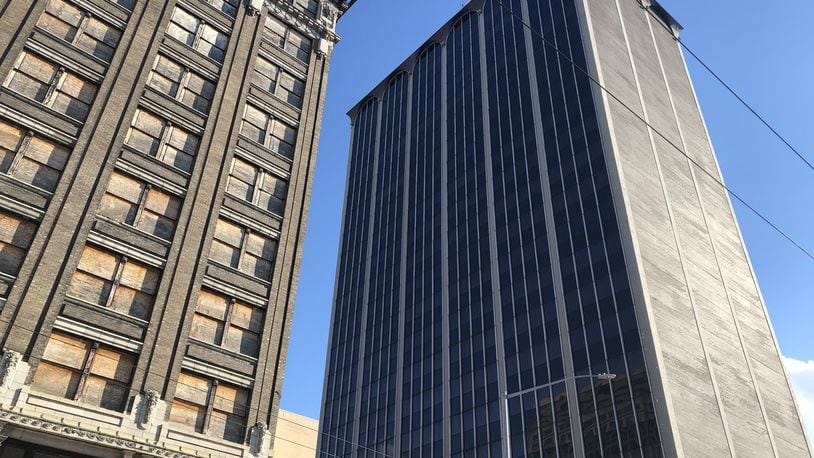The American Hotel & Lodging Association recently said record low hotel revenues and occupancy rates are not expected to return to 2019 levels until at least 2022.
The developer of the Grant-Deneau Tower, Dayton's first modern skyscraper, says it may have to reconsider the hotel part of its project and might instead expand its spaces for offices and apartments.
But the group redeveloping the Barclay Building on North Main Street says it is confident hotel demand will rebound and its product will be a welcome addition downtown.
“With an anticipated opening Q4 2021, we believe that the recovery will be well underway and that hotel demand will eventually exceed previous levels,” said Stephen Schwartz, chairman of First Hospitality, which is co-developing the project with Lawyers Development.
MORE: 4 downtown Dayton buildings sold over past month
More than 50 developers across the state have applied for state historic preservation tax credits in the latest round to help finance historic rehabilitation projects.
Applicants have requested nearly $79 million in tax credits, which far exceeds the less than $27 million the state currently has to award. Awards are expected to be announced in late July. Two projects in Dayton applied for incentives, and one in Piqua.
Windsor Tower LLC says it plans to invest nearly $39 million to renovate the Grant-Deneau Tower at 40 W. Fourth St.
The developer, who is transforming the nearby Fire Blocks District with the help of historic tax credits, says it has secured about $22.5 million in bank financing and $3 million in investor financing for the project, according to its Ohio Historic Preservation Tax Credit application.
Windsor Tower has requested more than $3.8 million in state historic tax credit incentives to close what it says is a financing gap to make the project a reality.
Constructed in 1969, the Grant-Deneau Tower is a 22-story building that has been deemed so historically significant that it was placed on the National Register of Historic Places years before it normally would qualify.
Windsor says it wants to create about 100 new market-rate apartments in the building on floors 12 to 21.
Floors one to six will be for a future tenant, the company said, and the top floor is expected to become a leasing office and event and community space.
MORE: Downtown Dayton to get a new hotel with rooftop bar
Floors seven to 11 will be used by Hotel Capital LLC, which is a private equity real estate management firm, according to the tax credit application.
Eric VanZwieten, head of marketing for parent company Windsor Companies, said the plan was to create new hotel rooms in the office tower that would have a boutique-kind-of feel.
But he said COVID-19 could change that, and the tower may end up being offices on the lower half and apartments on the top.
Windsor says it already has invested more than $3.4 million in the project, and if it gets state historic tax credits in the summer round, rehab of the Grant-Deneau Tower could begin in the third quarter of this year.
Windsor says it hopes to complete the project in the third quarter of 2022.
First Hospitality and Lawyers Development requested $2.5 million in state historic tax credits for a $25 million rehab of the Barclay Building.
The development team proposes transforming and modernizing the 10-story building from outdated commercial office space into a full-service boutique hotel in which every guest room is different.
Last year, this newspaper reported that city building permits indicated the hotel would be part of the Tapestry Collection by Hilton. It will be called Hotel Ardent.
PHOTOS: Downtown Dayton’s first new hotel in decades opens soon, and here’s what you should know about it
The developers say central downtown has an “acute” need for additional hotel rooms to serve the arts, entertainment, convention and travel segments of the local economy.
The group said a business survey by the Downtown Dayton Partnership found that 92% of business travelers were not staying downtown because of a lack of options.
Downtown welcomed its first newly constructed hotel in 2018, and the developer behind that project already plans to build another new hotel just blocks away.
Work on the Barclay building was expected to start this spring and will take about 12 to 14 months to complete, according to the developer’s tax credit application.
Schwartz, chairman of First Hospitality, said the project will bring 130 new, upscale rooms to downtown, as well as a contemporary dining experience.
“Economically, it will provide 60+ good jobs and an opportunity to join one of the most respected hospitality management companies with locations throughout Ohio,” he said.
The coronavirus pandemic pushed the hotel industry to the brink of collapse, as hotel occupancy fell to the lowest level on record due to a sharp decline in business and leisure travel, according to the American Hotel & Lodging Association.
The association says six in 10 hotel rooms remain empty, and about 70% of hotel employees have been laid off or furloughed.
In the week ending June 13, average hotel occupancy rate across the state was about 39.8 percent, which has risen from May and April, said Joe Savarise, executive director of the Ohio Hotel & Lodging Association.
Actual occupancy rates are lower than these estimates, because they do not include temporarily closed hotels with zero guests, he said.
Consumer confidence will be the key to recovery, and the fundamentals of the travel economy are strong in Dayton and the rest of the state, and existing hotel development projects should largely continue to move forward, he said.
But Savarise said the hotel industry expects its recovery will last at least into 2020.
“For comparison, after 9/11 it took hotels three years to return to prior performance levels, after the 2008 financial crisis it took six years,” he said.
About the Author
